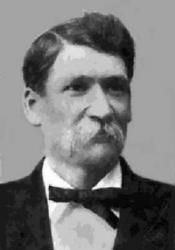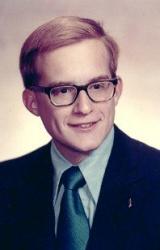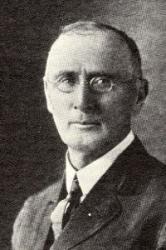Planning worship?
Check out our sister site, ZeteoSearch.org,
for 20+ additional resources related to your search.
- |
User Links
Person Results
Charles C. Converse

1832 - 1918 Person Name: C. C. Converse Composer of "[Fading away, like the stars of the morning]" in Songs of the Covenant Pseudonyms: Clare, Lester Vesé, Nevers, Karl Reden, Revons
=================================
Charles Crozat Converse LLD USA 1832-1918. Born in Warren, MA, he went to Leipzig, Germany to study law and philosophy, as well as music theory and composition under Moritz Hauptmann, Friedrich Richter, and Louis Plaidy at the Leipzig Conservatory. He also met Franz Liszt and Louis Spohr. He became an author, composer, arranger and editor. He returned to the states in 1859 and graduated from the Albany, NY, Law School two years later. He married Lida Lewis. From 1875 he practiced law in Erie, PA, and also was put in charge of the Burdetta Organ Company. He composed hymn tunes and other works. He was offered a DM degree for his Psalm 126 cantata, but he declined the offer. In 1895 Rutherford College honored him with a LLD degree. He spent his last years in Highwood, NJ, where he died. He published “New method for the guitar”, “Musical bouquet”, “The 126th Psalm”, “Sweet singer”, “Church singer”, “Sayings of Sages” between 1855 and 1863. he also wrote the “Turkish battle polka” and “Rock beside the sea” ballad, and “The anthem book of the Episcopal Methodist Church”.
John Perry
Charles C. Converse
T. C. O'Kane

1830 - 1912 Composer of "[Up and away like the dew of the morning]" in Morning Stars O'Kane, Tullius Clinton, an American writer, born March 10, 1830, is the author of "O sing of Jesus, Lamb of God" (Redemption); and "Who, who are these beside the chilly wave?" (Triumph in Death), in I. D. Sankey's Sacred Songs and Solos, 1878 and 1881.
--John Julian, Dictionary of Hymnology, Appendix, Part II (1907)
===========================
Tullius Clinton O'Kane was born in Fairfield County, Ohio, March 10, 1830. He resided with his parents in this vicinity until the spring of 1849, when he went to Delaware, Ohio, and entered the Ohio Wesleyan University, from which he graduated in 1852, with the degree A. B., and received his A. M. degree three years later from his Alma Mater.
Immediately upon his graduation, he was tendered a position in the Faculty as Tutor of Mathematics, which he accepted and successfully filled for five years. The students always called him "Professor," by which title he is known to the present day.
His musical abilities were early recognized in the University, and for years he was the musical precentor in the daily chapel devotions. He organized and maintained a Choral Society in the College, and was the first musical instructor in the Ohio Wesleyan Female College, which a few years ago was incorporated into the University.
In 1857 he was elected to a principalship in the Cincinnati public schools, and served in that capacity until 1861, when he resigned his position to accept a place in the piano establishment of Philip Phillips & Co. He remained with this house until its removal to New York City in 1867, when, although urged to be transferred with the house to that city, he preferred to remove with his family back to Delaware, Ohio.
For the ensuing six years he traveled over the state of Ohio as the general agent for the Smith American Organ Co., of Boston, Mass. During this time he visited conferences, Sunday-school conventions, both State and County, introducing his Sunday-school singing books, and in this way became well known throughout his native state, and quite extensively in some of the adjoining states.
His musical compositions were first published in Philip Phillips' Musical Leaves, in 1865, and since then but few Sunday-school singing books have appeared without one or more of his compositions.
His first music book, Fresh Leaves, was issued in 1868. This was followed at intervals by Dew Drops, Songs of Worship, Every Sabbath, Jasper and Gold, Redeemer's Praise, Glorious Things and Morning Stars. In connection with his son, Edward T. O'Kane, who is himself a most excellent composer and a very skillful organist, in 1882 he issued Selected Anthems, a book designed for use by the more advanced choirs. In association with J. R. Sweney and "Chaplain" McCabe, he issued Joy to the World, a song book for prayer-meetings, and the same editors, with the addition of W. J. Kirkpatrick, compiled Songs of Redeeming Love, No. 1, in 1882, and No. 2 in 1884. He also issued Songs of Praises, Unfading Treasures and Forward Songs.
Some of Professor O'Kane's best known songs are Glorious Fountain, The Home Over There, On Jordan's Stormy Banks, Say, are You Ready? and many others. With Mr. O'Kane, music and musical composition have ever been a recreation, rather than a profession. He is an excellent leader of choirs, but his forte seems to be in leading large congregations, Sunday-schools and social religious meetings in sacred song. He sings "with the spirit and the understanding also " — with a due appreciation of both words and music — and very naturally infuses his enthusiasm into his audiences so that they cannot "keep from singing." In his music he endeavors to catch the spirit of the hymn, and then give it expression in the music he composes for it. This sometimes seems to have been almost an inspiration, and could be illustrated by a reference to the circumstances under which many of his compositions have been made.
One of his earlier and more widely known pieces is that entitled, Over There. He says he cut this hymn out of some newspaper and put it with others in his portfolio, intending some time when he felt like it to give it a musical setting. One Sunday afternoon, after studying his lesson for the next session of his Sunday-school, he opened his portfolio, and turning over the selections, found these words, and something seemed to say, "Now's your time." He sat down at the organ, studied the hymn intently for a few moments, and then, as his fingers touched the keys of the instrument, melody and harmony were in every movement, and when the stanza was ended, melody and harmony found their expression in the chorus, and Over There was finished.
Another of his well known songs is Sweeping Through the Gates. One cold, blustery day he had occasion to go from his residence to the railroad depot, about a mile distant, and in his route had to cross the river on a suspension foot-bridge. As he came down to the bridge, he thought of the "river of death," so cold, with no bridge, and then the words of the dying Cookman came to his mind, and he exclaimed to himself:
'Who, who are these beside the chilly wave? "
Words, melody and refrain seemed to come all at once and all together, so that by the time he arrived back at his home, the composition was complete.
Professor O'Kane is a genial, modest Christian gentleman, who carries sunshine wherever he goes. His greatest joy comes from the consciousness that his music has cheered and comforted the hearts of Christian people all over the world, and has been the means of winning thousands from the pleasures of the world to the higher enjoyments of the Christian religion. His song, Sweeping Through the Gates, will be sung till all the ransomed are gathered Over There.
-Hall, J. H. (c1914). Biographies of Gospel Song and Hymn Writers. New York: Fleming H. Revell Company.
========================
O'Kane, Tullius Clinton. Died 10 February 1912, Delaware, Ohio. Buried in Oak Grove Cemetery, Delaware, Ohio.
--DNAH Archives
T. C. O'Kane
Asa Hull

1828 - 1907 Composer of "[Up and away, like the dew of the morning]" in Gospel Praise Book. Asa Hull USA 1828-1907. Born in Keene, NY, he became a music publisher in New York City. He married Emma F Atherton, and they had a daughter, Harriett. He wrote many tunes and authored temperance rallying songs. He published 33 works, of which 21 were songbooks, between 1863-1895. He died in Philadelphia, PA.
John Perry
Asa Hull
L. L. Pickett

1859 - 1928 Person Name: Rev. L. L. Pickett Composer of "[Up and away, like the dew of the morning]" in Tears and Triumphs Rv Leander Lycurgus Pickett USA 1859-1928. Born at Burnsville, MS, he became a Methodist evangelist. He held meetings in several states and at Holiness campgrounds. After marrying Ludie, they served pastorates in northeast TX, and Columbia, SC, before moving to Wilmore, KY. Pickett married Pruvy Melviney Dorough in 1878, and they had a son, James, in 1880. After her death in 1887, he married Ludie in 1888. He was a renowned speaker, leader, minister, author, hymnwriter, and patriot, prominent in the Holiness Movement, and helped found Asbury College (now University), at Wilmore, KY, where he also served as the financial agent of the board of trustees for many years. The Picketts boarded m,inistry students attending Asbury, among whom was missionary E Stanley Jones. In 1905 a student prayer meeting at the Pickett home spilled out to the Asbury campus in a revival that spread around the town of Wilmore. Between 1891 and 1926 Pickett published 11 song books, some with others, including John Sweney, William J Kirkpatrick, John Bryant, Martin Knapp, Elisha A Hoffman, Burke Culpepper, William Marks, Benjamin Butts, and Robert McNeill. He died at Middlesboro, KY.
John Perry
L. L. Pickett
George C. Hugg

1848 - 1907 Person Name: Geo. C. Hugg Composer of "[Up and away, like the dew of the morning]" in The Helper in Sacred Song George Crawford Hugg USA 1848-1907. Born near Haddonfield, NJ, he became choirmaster at the Berlin, NJ, Presbyterian Church at age 12. At age 14 he published his first song, “Walk in the light”, which became very popular. He married Anne E Ketchum, and they had a daughter, Evangeline. He served as choirmaster of the Tabernacle Presbyterian Church in Philadelphia, and also the Broad Street and Arch Street Methodist Episcopal Churches there. He was also closely associated with the Harper Memorial Presbyterian Church there. He was a prolific composer with over 2000 works, publishing 18 books of revival and Sunday school music, and 90 songs for special occasions (Christmas, Easter, etc.). He died in Philadelphia, PA.
John Perry
George C. Hugg
Richard W. Adams

b. 1952 Adapter of "What I Have Done" in The Cyber Hymnal Born: 1952, Missouri.
Adams graduated from the University of Missouri, Columbia (BA 1974, cum laude, Phi Beta Kappa).
Richard W. Adams
Carrie B. Adams

1859 - 1940 Person Name: Mrs. Carrie B. Adams Composer of "[Fading away like the stars of the morning] " in Service Songs for Young People's Societies, Sunday Schools and Church Prayer Meetings Adams, Carrie Belle (Wilson). (Oxford, Ohio, July 28, 1859-1940). Father, David Wilson, song writer, teacher of music. Married, 1880 to Allyn G. Adams, moved to Terre Haute, Indiana. Director and organist, First Congregational Church; Central Christian Church. Teacher (1887-1895), Indiana State Normal School. Wrote many anthems and cantatas, secular and religious, many published by Lorenz.
--Keith C. Clark, DNAH Archives
===================
Mrs. Carrie B. (Wilson) Adams was born in Oxford, Ohio, July 28, 1859. Her father, Mr. David Wilson, was author of a number of songs and books, also a singing teacher of note in his day, and her mother was quite musically inclined.
Her experience with her father in elementary and advanced class work, in children's and harmony classes, her years of musical participation in solo work and in accompanying, in the organization and leadership, not only of choirs, but also of great choral organizations, her close touch with singers of elementary grade, as well as those of great skill and reputation, have given her a breadth of musical thought and practical power of adaptation that constantly enrich her work of composition.
Miss Carrie B. Wilson became Mrs. Allyn G. Adams in 1880, and soon after located in Terre Haute, Ind., where her husband was a leading bass singer and interested in large commercial enterprises. Mrs. Adams soon became a leading figure in the musical life of that enterprising city, and has been actively identified with the Choral Club, Treble Clef Club, Rose Polytechnic Glee Club, First Congregational Church and Central Christian Church choirs, as director, chorister and organist. From 1887 to 1895 she occupied the chair of music in the Indiana State Normal School.
Her first anthem was published in 1876. Among her best known publications are four anthem books — "Anthem Annual, Nos. 1 and 2," and " Royal Anthems, Nos. 1 and 2" ; "Music for Common Schools"; two sacred cantatas, "Redeemer and King " and "Easter Praise" ; an operetta for church and school use, "The National Flower"; a group of Shakespeare songs from "As You Like it," and a large number of anthems,
male choruses, ladies' quartets and miscellaneous pieces in octavo form.
http://archive.org/stream/biographyofgospe00hall/biographyofgospe00hall_djvu.txt
Carrie B. Adams
A. J. Abbey
1825 - 1887 Composer of "[Up and away, like the dew of the morning]" in The Banner of Victory Alonzo Judson Abbey, USA 1825-1887 Professor Abbey was a music teacher, collector, writer-composer, tune book compiler and sacred music publisher. George F Root often edited his published works.
John Perry
A. J. Abbey
J. M. Hunt
1855 - 1919 Composer of "[Fading away like the stars of the morning]" in Songs of Zion As of 1885, Hunt lived in Lampasas, Texas. His works include:
Harvest Bells, with William Penn
Harvest Bells No. 2, with William Penn (Cincinnati, Ohio: The John Church Company, 1885)
The Gospel Alarm, with Sanford Miller Brown (St. Louis, Missouri: Central Baptist, 1886)
The Missionary Triumph, with Sanford Miller Brown (Cincinnati, Ohio: The John Church Company, 1889)
Songs of Zion, with Sanford Miller Brown (Kansas City, Missouri: Word and Way Publishing Company, 1898)
--www.hymntime.com/tch
J. M. Hunt
H. N. Lincoln

1859 - 1948 Composer of "[Up and away like the dew of the morning]" in Song-Land Messenger Complete Horace Neely Lincoln, 1859-1948. Horace was the son of James Lincoln and Emaline King, and husband of Etta Lee Thurmand (married 1887).
He moved with his family to Texas when he was seven years old. At age 10, he began attending a singing school conducted by James M. Jolley of Mississippi. In 1880, he taught his first singing class in his old neighborhood school house. Later that year, he attended his first normal music school, taught at Mountain Home (now Holland), Texas.
Lincoln had other musical training under L. B. Shook (a former student of Philip Bliss) and John McPherson of Illinois. In 1898, he graduated from the Chicago National College of Music, and in 1906 took a post-graduate course under Horatio Palmer.
Lincoln eventually became president of the Songland Music Company, and the World’s Normal Musical College.
© The Cyber Hymnal™ (hymntime/tch)
H. N. Lincoln


 My Starred Hymns
My Starred Hymns


